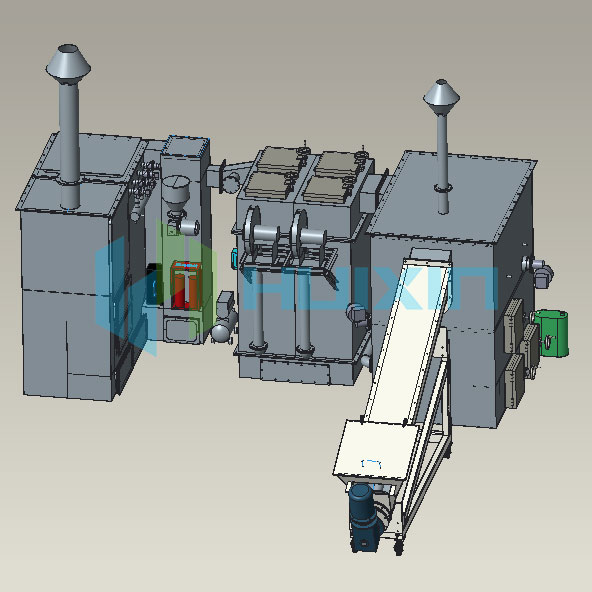Key Features that Differentiate an Environmental Friendly Waste Incinerator from Traditional Waste Incinerators
2024-06-27
As global environmental concerns rise, the need for sustainable waste management solutions becomes increasingly critical. Traditional waste incineration has long been used to reduce waste volume, but it often comes with significant environmental drawbacks, including harmful emissions and inefficient energy use. Enter the Environmental Friendly Waste Incinerator—a modern solution designed to address these issues and offer a greener alternative. In this blog, we will explore the key features that set an Environmental Friendly Waste Incinerator apart from traditional waste incinerators.
1. Advanced Emission Control Systems
One of the most significant advancements in Environmental Friendly Waste Incinerators is their sophisticated emission control systems. Traditional incinerators often release pollutants such as dioxins, furans, and heavy metals into the atmosphere, contributing to air pollution and health hazards.
- Scrubbers and Filters: Environmental Friendly Waste Incinerators are equipped with advanced scrubbers and filters that capture and neutralize harmful gases and particulates before they are released into the atmosphere.
- Catalytic Converters: These incinerators use catalytic converters to break down toxic compounds into less harmful substances, significantly reducing the emission of hazardous pollutants.
2. Energy Recovery and Efficiency
Traditional waste incinerators often waste a significant amount of energy. In contrast, Environmental Friendly Waste Incinerators are designed to maximize energy recovery, making them more efficient and sustainable.
- Heat Recovery Systems: These incinerators are equipped with heat recovery systems that capture the thermal energy generated during the incineration process. This energy can be converted into electricity or used for heating purposes, reducing the reliance on fossil fuels.
- High-Efficiency Combustion: Modern incinerators operate at higher temperatures and with more precise control, ensuring that waste is burned more completely and efficiently, leading to higher energy recovery rates.
3. Reduced Carbon Footprint
Environmental Friendly Waste Incinerators are engineered to minimize their carbon footprint, making them a more sustainable choice for waste management.
- Carbon Capture Technology: Some incinerators incorporate carbon capture technology that traps carbon dioxide emissions and prevents them from entering the atmosphere.
- Renewable Energy Integration: These incinerators can be integrated with renewable energy sources, such as solar or wind power, to further reduce their overall carbon footprint.
4. Advanced Monitoring and Control Systems
The incorporation of advanced monitoring and control systems is another key feature that differentiates Environmental Friendly Waste Incinerators from their traditional counterparts.
- Real-Time Monitoring: Continuous monitoring of emissions ensures that the incinerator operates within safe and regulatory limits. Any deviations are detected and corrected immediately.
- Automated Controls: Automated control systems optimize the incineration process, adjusting parameters such as temperature and airflow to ensure complete combustion and minimal emissions.
5. Versatility in Waste Handling
Environmental Friendly Waste Incinerators are designed to handle a wide variety of waste types, including hazardous and non-hazardous materials, without compromising environmental safety.
- Multi-Feed Systems: These incinerators can process multiple types of waste simultaneously, improving efficiency and reducing the need for separate waste streams.
- Adaptive Technology: Advanced adaptive technology allows the incinerator to adjust its operations based on the type and quantity of waste being processed, ensuring optimal performance and minimal environmental impact.
6. Compliance with Environmental Regulations
Modern incinerators are built to comply with stringent environmental regulations, ensuring they meet or exceed standards for emissions and waste processing.
- Regulatory Certifications: Environmental Friendly Waste Incinerators often come with certifications from environmental regulatory bodies, providing assurance of their safety and compliance.
- Regular Audits and Inspections: These incinerators undergo regular audits and inspections to ensure ongoing compliance with environmental standards, maintaining their status as a green technology.
Conclusion
Environmental Friendly Waste Incinerators represent a significant advancement in waste management technology. By incorporating advanced emission control systems, maximizing energy recovery, reducing carbon footprints, utilizing sophisticated monitoring and control systems, offering versatility in waste handling, and ensuring compliance with environmental regulations, these incinerators provide a more sustainable and eco-friendly solution for waste disposal. As we continue to seek ways to mitigate the environmental impact of our waste, investing in and adopting these advanced incineration technologies will be a crucial step towards a greener future.



